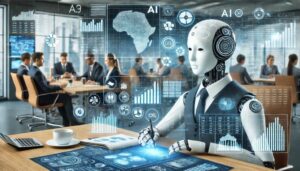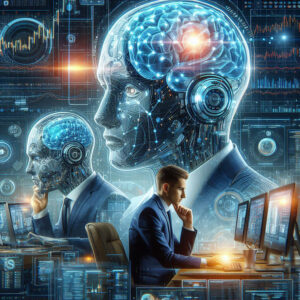AI and Crypto: How Artificial Intelligence Is Changing the Future of Digital Assets
The revolutionary intersection of AI and crypto technology stands as a watershed moment in the development of digital finance, fundamentally transforming how we conceptualize, interact with, and manage digital assets across the global economy. The foundational understanding of cryptocurrency emerged during intensive graduate studies in cryptology back in 2011, a time when Bitcoin served primarily as a transactional currency rather than the store of value it has become today. Those early days of cryptocurrency marked an era of pure technological innovation, where the groundbreaking potential of blockchain architecture promised to revolutionize not just financial transactions, but the very fabric of digital trust and verification systems. This period of cryptocurrency’s evolution provides crucial context for understanding how artificial intelligence is now poised to catalyze the next phase of digital asset development.
We strongly recommend that you check out our guide on how to take advantage of AI in today’s passive income economy.
Table of Contents
The Evolution of Artificial Intelligence in Digital Finance
The journey of artificial intelligence from its inception in 1956 to its current state represents one of the most remarkable technological progressions in human history. While contemporary discussions often center around ChatGPT and similar language models, the true scope of AI encompasses three distinct and equally revolutionary branches: machine learning, natural language processing, and computer vision. Each of these branches brings unique capabilities to the financial sector, with machine learning algorithms optimizing trading strategies and risk assessment, natural language processing revolutionizing customer service and market analysis, and computer vision enabling advanced security measures and identity verification in digital transactions. The synthesis of these AI components with blockchain technology creates a powerful framework for developing more sophisticated, secure, and accessible financial systems that could fundamentally reshape our understanding of digital assets and their potential applications.
Understanding the AI Revolution
The current artificial intelligence revolution mirrors the transformative impact of the Industrial Revolution, but with even more far-reaching implications for society and economic systems. Unlike previous technological advancements that primarily affected physical labor, AI’s influence extends into cognitive tasks, decision-making processes, and creative endeavors. This transformation is not merely about automating existing processes; it’s about reimagining how businesses operate, how value is created and transferred, and how financial systems can better serve human needs. The integration of AI into various sectors has already begun to showcase its potential, from predictive analytics in financial markets to automated risk assessment in lending practices. Historical parallels, such as the introduction of personal computers in the 1980s, demonstrate how technological revolutions tend to create more opportunities than they eliminate, despite initial concerns about job displacement.
The Convergence of AI and Blockchain Technology
The merger of artificial intelligence and blockchain technology represents more than just a technological convergence; it signifies the potential solution to some of blockchain’s most persistent challenges. While blockchain technology has demonstrated remarkable potential for creating transparent, immutable records of transactions and data, its practical applications have largely remained confined to speculative investment vehicles. The current state of cryptocurrency, despite strong fundamental beliefs in its potential, primarily operates as a speculative asset class rather than the revolutionary payment system it was envisioned to be. This limitation stems not from any inherent flaw in blockchain technology, but from the need for more sophisticated systems to manage and optimize its capabilities.
The true potential of this convergence lies in how AI can enhance blockchain’s core functionalities. Artificial intelligence can improve scalability through optimized consensus mechanisms, enhance security through advanced threat detection, and create more efficient smart contracts through automated code generation and verification. These improvements address many of the technical limitations that have historically prevented blockchain technology from achieving widespread adoption in everyday transactions and industrial applications.
Democratizing AI Through Tokenization
The development of advanced AI systems by major technology companies such as Nvidia, OpenAI, Meta, and Tesla represents both an opportunity and a potential risk for society. While these companies possess the resources and expertise to push the boundaries of what’s possible with artificial intelligence, the concentration of such powerful capabilities in the hands of a few corporations raises significant concerns about centralization and control. The prospect of a small group of companies controlling AI systems that could influence credit decisions, employment opportunities, and various other aspects of daily life presents a clear need for democratization of these technologies.
Blockchain-based tokenization of AI models offers a compelling solution to this centralization problem. By allowing fractional ownership of AI models through tokens, this approach creates a more inclusive ecosystem where individuals and smaller organizations can participate in the development and governance of AI systems. This democratization extends beyond mere ownership; it creates economic opportunities for those who might be displaced by AI automation, allowing them to benefit from the very technologies that are changing their industries.
The Future of AI-Enhanced Blockchain Applications
The practical implementation of AI in blockchain technology is already yielding significant results in cryptocurrency mining operations. Leading companies in the mining sector, including Riot Blockchain and Hive, have begun implementing sophisticated AI systems to optimize their operations. These AI systems analyze vast amounts of data in real-time, adjusting mining parameters to maximize efficiency and minimize energy consumption. This application addresses one of the most significant criticisms of cryptocurrency mining – its environmental impact – while demonstrating the practical benefits of AI integration in blockchain operations.
The optimization of mining operations represents just one facet of how AI can enhance blockchain technology. Advanced AI systems can also improve transaction processing speeds, predict network congestion, and automatically adjust gas fees to ensure optimal performance. These improvements make blockchain technology more practical for everyday use while maintaining its core benefits of security and decentralization.
Creating a Transparent AI Marketplace
The establishment of a transparent marketplace for AI models through blockchain technology represents a crucial step toward democratizing artificial intelligence development. This marketplace would enable smaller developers and organizations to compete with larger corporations by providing access to funding, resources, and user bases through tokenization. The transparency inherent in blockchain technology ensures that the development and deployment of AI models remain visible and accountable to stakeholders, while smart contracts can automate revenue sharing and governance processes.
The Impact on Digital Asset Markets
The cryptocurrency market’s cyclical nature, influenced by events like Bitcoin halving and broader technological trends, suggests that AI-related tokens could become the next major focus for investors and developers. The success of AI-focused companies in traditional stock markets, with significant gains seen in companies like Nvidia and C3.ai, indicates strong market interest in artificial intelligence technologies. This trend could easily extend to cryptocurrency markets, with tokens that facilitate the integration of AI and blockchain technology potentially leading the next wave of innovation and investment.
Ensuring Ethical Governance and Security
The integration of AI and blockchain technology necessitates robust frameworks for ethical governance and security. The development of these systems must prioritize transparency, accountability, and user privacy while maintaining the decentralized nature of blockchain technology. Platforms focusing on these aspects demonstrate how technological advancement can be balanced with responsible development practices, ensuring that the benefits of AI and blockchain integration are realized without compromising fundamental values or security requirements.
The Path Forward
The convergence of artificial intelligence and blockchain technology represents a transformative moment in the evolution of digital assets and financial systems. This integration promises to address many of the current limitations of both technologies while creating new opportunities for innovation, investment, and societal advancement. As these technologies continue to evolve and merge, they will likely create entirely new paradigms for how we interact with digital assets, conduct financial transactions, and manage economic relationships. The success of this integration will depend on maintaining a balance between innovation and responsibility, ensuring that the benefits of these technologies are distributed broadly while managing potential risks and challenges effectively.

We strongly recommend that you check out our guide on how to take advantage of AI in today’s passive income economy.




